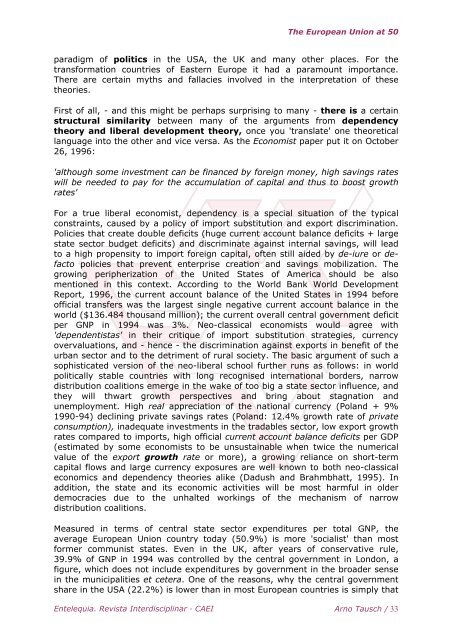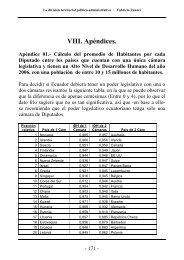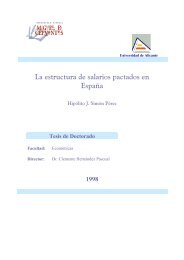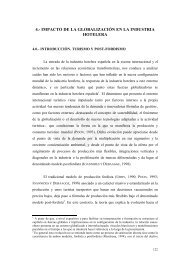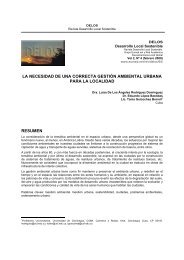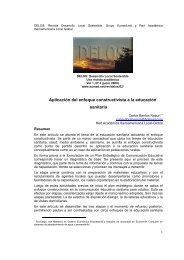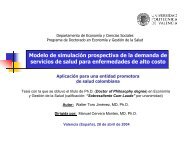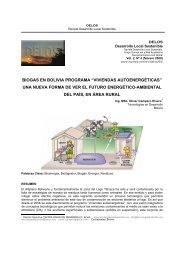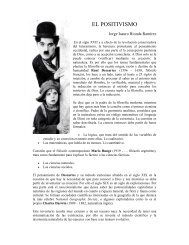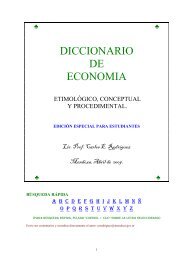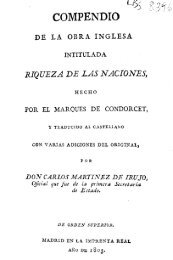Download the full book in PDF format - Eumed.net
Download the full book in PDF format - Eumed.net
Download the full book in PDF format - Eumed.net
Create successful ePaper yourself
Turn your PDF publications into a flip-book with our unique Google optimized e-Paper software.
The European Union at 50<br />
paradigm of politics <strong>in</strong> <strong>the</strong> USA, <strong>the</strong> UK and many o<strong>the</strong>r places. For <strong>the</strong><br />
trans<strong>format</strong>ion countries of Eastern Europe it had a paramount importance.<br />
There are certa<strong>in</strong> myths and fallacies <strong>in</strong>volved <strong>in</strong> <strong>the</strong> <strong>in</strong>terpretation of <strong>the</strong>se<br />
<strong>the</strong>ories.<br />
First of all, - and this might be perhaps surpris<strong>in</strong>g to many - <strong>the</strong>re is a certa<strong>in</strong><br />
structural similarity between many of <strong>the</strong> arguments from dependency<br />
<strong>the</strong>ory and liberal development <strong>the</strong>ory, once you 'translate' one <strong>the</strong>oretical<br />
language <strong>in</strong>to <strong>the</strong> o<strong>the</strong>r and vice versa. As <strong>the</strong> Economist paper put it on October<br />
26, 1996:<br />
'although some <strong>in</strong>vestment can be f<strong>in</strong>anced by foreign money, high sav<strong>in</strong>gs rates<br />
will be needed to pay for <strong>the</strong> accumulation of capital and thus to boost growth<br />
rates'<br />
For a true liberal economist, dependency is a special situation of <strong>the</strong> typical<br />
constra<strong>in</strong>ts, caused by a policy of import substitution and export discrim<strong>in</strong>ation.<br />
Policies that create double deficits (huge current account balance deficits + large<br />
state sector budget deficits) and discrim<strong>in</strong>ate aga<strong>in</strong>st <strong>in</strong>ternal sav<strong>in</strong>gs, will lead<br />
to a high propensity to import foreign capital, often still aided by de-iure or defacto<br />
policies that prevent enterprise creation and sav<strong>in</strong>gs mobilization. The<br />
grow<strong>in</strong>g peripherization of <strong>the</strong> United States of America should be also<br />
mentioned <strong>in</strong> this context. Accord<strong>in</strong>g to <strong>the</strong> World Bank World Development<br />
Report, 1996, <strong>the</strong> current account balance of <strong>the</strong> United States <strong>in</strong> 1994 before<br />
official transfers was <strong>the</strong> largest s<strong>in</strong>gle negative current account balance <strong>in</strong> <strong>the</strong><br />
world ($136.484 thousand million); <strong>the</strong> current overall central government deficit<br />
per GNP <strong>in</strong> 1994 was 3%. Neo-classical economists would agree with<br />
'dependentistas' <strong>in</strong> <strong>the</strong>ir critique of import substitution strategies, currency<br />
overvaluations, and - hence - <strong>the</strong> discrim<strong>in</strong>ation aga<strong>in</strong>st exports <strong>in</strong> benefit of <strong>the</strong><br />
urban sector and to <strong>the</strong> detriment of rural society. The basic argument of such a<br />
sophisticated version of <strong>the</strong> neo-liberal school fur<strong>the</strong>r runs as follows: <strong>in</strong> world<br />
politically stable countries with long recognised <strong>in</strong>ternational borders, narrow<br />
distribution coalitions emerge <strong>in</strong> <strong>the</strong> wake of too big a state sector <strong>in</strong>fluence, and<br />
<strong>the</strong>y will thwart growth perspectives and br<strong>in</strong>g about stagnation and<br />
unemployment. High real appreciation of <strong>the</strong> national currency (Poland + 9%<br />
1990-94) decl<strong>in</strong><strong>in</strong>g private sav<strong>in</strong>gs rates (Poland: 12.4% growth rate of private<br />
consumption), <strong>in</strong>adequate <strong>in</strong>vestments <strong>in</strong> <strong>the</strong> tradables sector, low export growth<br />
rates compared to imports, high official current account balance deficits per GDP<br />
(estimated by some economists to be unsusta<strong>in</strong>able when twice <strong>the</strong> numerical<br />
value of <strong>the</strong> export growth rate or more), a grow<strong>in</strong>g reliance on short-term<br />
capital flows and large currency exposures are well known to both neo-classical<br />
economics and dependency <strong>the</strong>ories alike (Dadush and Brahmbhatt, 1995). In<br />
addition, <strong>the</strong> state and its economic activities will be most harmful <strong>in</strong> older<br />
democracies due to <strong>the</strong> unhalted work<strong>in</strong>gs of <strong>the</strong> mechanism of narrow<br />
distribution coalitions.<br />
Measured <strong>in</strong> terms of central state sector expenditures per total GNP, <strong>the</strong><br />
average European Union country today (50.9%) is more 'socialist' than most<br />
former communist states. Even <strong>in</strong> <strong>the</strong> UK, after years of conservative rule,<br />
39.9% of GNP <strong>in</strong> 1994 was controlled by <strong>the</strong> central government <strong>in</strong> London, a<br />
figure, which does not <strong>in</strong>clude expenditures by government <strong>in</strong> <strong>the</strong> broader sense<br />
<strong>in</strong> <strong>the</strong> municipalities et cetera. One of <strong>the</strong> reasons, why <strong>the</strong> central government<br />
share <strong>in</strong> <strong>the</strong> USA (22.2%) is lower than <strong>in</strong> most European countries is simply that<br />
Entelequia. Revista Interdiscipl<strong>in</strong>ar · CAEI Arno Tausch / 33


